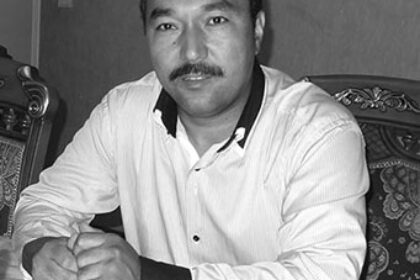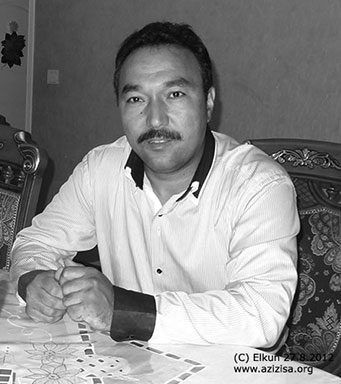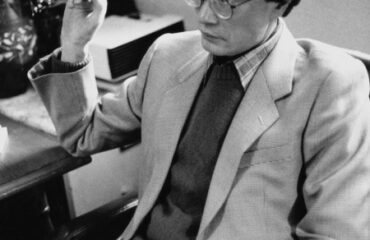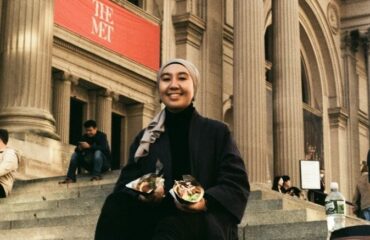MOTHER TONGUE by Adil Tuniyaz trans. Munawwar Abdulla

We were born like gold
on this sparkling brown land.
It fell, ringing
from the mouth of an Uyghur angel,
its music sunk into our ears.
Oh, mother tongue,
we became wanderers,
and have moved far from your horizons.
Opium poppies
bring the scent of the seas,
thoughts kept moist for a while.
I have left the radio on.
It speaks
in the wind.
Cool orchards
Oil, sandy mountains
A group of people whose colours have drained,
dead still cities and winter pastures.
I drank coffee
and cried.
The ocean waves entered my home.
A note on Adil Tuniyaz by Munawwar Abdulla
The current whereabouts of Adil Tuniyaz is unknown. Most likely, he is in a jail in Urumchi, the capital of occupied East Turkistan, in Xinjiang, China.
Adil Tuniyaz, his wife Nezire Muhammad, eldest son Imran, and father-in-law Muhammad Salih Hajim, were all arrested in December 2017 during the Chinese government’s mass incarceration campaign that displaced millions of Uyghurs into re-education camps, prisons, and forced labor factories. The official charges for Tuniyaz and his family’s arrests were “promoting terrorism and religious extremism”. Multiple sources have speculated that the family were detained for their work translating religious texts such as Islamic hadiths into Uyghur. Muhammad Salih Hajim was a prominent religious scholar who was credited with being the first to translate the Quran (with permission from the government). He was confirmed to have died in a re-education camp in January 2018. It is difficult to know the current status of the rest of the incarcerated family.
China has denied the existence of “re-education” camps, then rebranded them as vocational training centers, then defended them as deradicalization training, and now claims that they have closed. Still, the number of prison sentences have skyrocketed, and many of those camps have always been attached to forced labor factories. People from every age group, religion, career, or academic background were targeted with no opportunity to ask for evidence for arrest or appeal for release.
Along with the crackdown on bodies, there has been a crackdown on thought. Knowledge. Language. Many writers, artists, publishers, even literature and anthropology professors, have been given long prison sentences for vague reasons with no trial. Tuniyaz’s cohort of modernist poets included Perhat Tursun, a controversial and secular writer who is now serving 16 years in prison after being arrested in January 2018 for unknown reasons. Another is Tahir Hamut, who managed to escape to the US and write about his harrowing experiences as an artist navigating state control in his book Waiting to Be Arrested at Night (2023).
While we wait to hear of Adil Tuniyaz’s fate, it feels important to share his old poetry. We sink into the softness of his longing for familiar sounds and horizons while in a foreign land. We think of his connection to identity and the way he transposes Islamic mystic elements onto Uyghur cultural motifs. I marvel at the scents and melodies he infuses into his poems. And I note the irony of translating a poem called Mother Tongue, and wonder if I have become unanchored like him, and maybe I should drink coffee, and maybe I should cry.

Adil Tuniyaz (b. 1970) is a well-known poet, journalist, and author of the books Questions for an Apple and Manifesto for Universal Poetry. He is often considered to be among the first generation of modernist Uyghur poets. Publishing his first poem in the journal Xinjiang Youth Daily at just 12 years old, Tuniyaz continued to pursue his passion for literature at Xinjiang University in Urumchi. After graduating in 1993, he became a journalist for Xinjiang Radio while continuing to publish his poems in literary journals, as well as several of his own collections of essays and poetry. In the late 1990s, he left his journalist role to continue his literary studies in Saudi Arabia, returning to Urumchi a decade later. In 2015, he and his wife, Nezire, opened the Light and Pen bookstore. Tuniyaz’s poetry often touches on topics such as Islamic mysticism, Uyghur culture and identity, and many contemporary themes that have made him a popular poet in Uyghur society.


